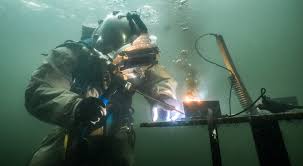
KIMPALAN bawah air (underwater welding) antara kerjaya dalam bidang kimpalan yang mempunyai jaringan pekerjaan luas di serata dunia turut membabitkan industri seperti minyak dan gas, pembaikan kapal, perpaipan saluran minyak dan sebagainya.
Sesuai dengan namanya, kerjaya ini memerlukan mereka yang berani, minat mendalam, sihat, tahan lasak dan memiliki kemahiran dalam kedua-duanya iaitu sebagai jurukimpal dan penyelam komersial.
Tidak dinafikan pendapatan yang diterima adalah lumayan sekitar RM50,000 sehingga ratusan ribu ringgit setahun.
Jumlah pendapatan bagi kerjaya ini adalah subjektif kerana dibayar berdasarkan kepada projek, kaedah dan kedalaman selaman serta keadaan persekitaran.
Ketua Jabatan Kimpalan, Institut Kemahiran Tinggi Belia Negara (IKTBN) Pagoh, Muar, Johor Wan Mohd Zafrulizan Wan Draman berkata, untuk menjadi seorang ‘diver-welder’, seseorang perlu mempunyai sijil dalam kemahiran mengimpal dan memiliki lesen sebagai penyelam komersial.
Bagaimanapun, katanya buat masa ini kursus ‘underwater welding’ tidak dijalankan di Jabatan Kimpalan IKTBN Pagoh tetapi hanya fokus kepada kursus kimpalan.
“Terdapat beberapa pusat latihan di Malaysia yang menjalankan kursus ini dan mengeluarkan sijil yang diiktiraf badan antarabangsa.
“Kursus untuk ‘underwater inspection’ juga sudah ada dijalankan di Malaysia ketika ini berbanding sebelum ini hanya boleh diikuti di luar negara.
“Kos untuk menjalani kursus bagi menceburi bidang ‘underwater welding’ ini sememangnya tinggi dan mencecah puluhan ribu ringgit bergantung kepada pusat latihan berkenaan.
“Namun wang yang dilaburkan berbaloi kerana latihan turut membabitkan penggunaan peralatan mahal serta pengalaman yang bakal diperoleh bukan calang-calang dan amat diperlukan sebelum layak digelar jurukimpal bawah air (‘diver-welder’), ” katanya.
Mengulas mengenai risiko kerjaya itu kata Wan Mohd Zafrulizan, ia adalah tinggi dan ada yang membawa maut.
Risiko seperti kejutan elektrik dan letupan juga boleh terjadi apabila hidrogen serta oksigen digunakan ketika proses mengimpal.
“Bagaimanapun, terdapat prosedur operasi standard (SOP) yang perlu dipatuhi setiap jurukimpal bawah air sebelum, ketika dan selepas selesai kerja.
“Amalan standard ini boleh mengelakkan bahaya dan kejadian yang tidak dingini daripada berlaku,” katanya.
Pada masa sama, bidang kimpalan ditawarkan di IKTBN Pagoh pada 2003.
Selepas hampir 17 tahun beroperasi lebih daripada 2,000 graduan dilatih di peringkat sijil dan diploma.
Purata kadar kebolehpasaran untuk bidang ini dari 2016 sehingga 2019 amat memberangsangkan apabila lebih 90 peratus graduan berjaya mendapatkan pekerjaan di pelbagai sektor dalam tempoh enam bulan selepas tamat pengajian.
Kata Wan Mohd Zafrulizan, permintaan industri kimpalan adalah tinggi dan konsisten untuk penempatan pekerjaan.
Graduan sangat bertuah kerana bidang ini boleh dikatakan fleksibel walaupun mereka beralih arah ke pekerjaan di industri berlainan. Perkembangan industri sekarang adalah pesat terutama dari segi teknologi.
Tidak dinafikan sesetengah teknologi adalah asing kepada pelajar mahupun tenaga pengajar. Ini antara salah satu mengapa On Job Training (OJT) di industri menjadi perkara wajib kepada pelajar.
Semua pelajar SKM (Sijil Kemahiran Malaysia) dan DKM (Diploma Kemahiran Malaysia) perlu menjalani OJT selama tiga bulan pada semester akhir pengajian. Secara tidak langsung didedahkan dengan cara kerja dan teknologi baharu.
Wan Mohd Zafrulizan – Ketua Jabatan Kimpalan, Institut Kemahiran Tinggi Belia Negara (IKTBN) Pagoh
Sumber: hmetro.com.my/akademia
Komen: Sekiranya anda rasa kerjaya ini tidak sesuai untuk anda, banyak lagi kerjaya kemahiran mempunyai prospek yang cerah dan tidak begitu merbahaya. Antara kursus kemahiran yang membolehkan anda memiliki kerjaya yang ada banyak peluang pekerjaan termasuk (tapi tidak terhad kepada):
- Kursus kulinari
- Kursus bakeri/pastri
- Kursus elektrik
- Kursus pendidikan awal kanak-kanak
- Kursus perakaunan
- Kursus mekatronik
- Kursus pengurusan hotel
- Kursus multimedia/pereka grafik
- Kursus IT (komputer sistem/rangkaian komputer/pembangunan aplikasi@programming)
- Kursus VTO (Vocational Training Operation)
Sekiranya anda tidak tahu kursus kemahiran apa lagi yang ditawarkan, boleh isi butiran anda di sini (pusat latihan swasta sahaja) ataupun whatsapp untuk bertanyakan kursus kemahiran (swasta sahaja)
Jika anda dah ada Sijil Kemahiran Malaysia/Diploma Kemahiran Malaysia/Diploma Vokasional Malaysia dan ingin meneruskan ke peringkat Ijazah, boleh baca sini.
